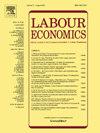社会主义,身份和失业妇女的福祉
IF 2.6
2区 经济学
Q2 ECONOMICS
引用次数: 0
摘要
失业对人们生活满意度的影响超出了收入的负冲击。大量文献研究了失业的这些非金钱成本,并强调了社会规范的重要性,尤其是对男性而言。我们通过表明不遵守规范可能同样夸大失业妇女福祉的非金钱损失来补充这一文献。使用德国的面板数据,我们将德国的划分作为自然实验来比较东德和西德不同队列女性与失业相关的生活满意度损失。我们假设,对于两种德国女性群体来说,在劳动参与方面不同的法律规范和分工后不同的工作机会成本塑造了社会身份,从而以不同的方式塑造了围绕工作的社会规范。东德妇女被要求工作,而西德妇女则被期望专注于照顾家庭。我们发现东德妇女比西德妇女更容易失业。这种差异完全是由在前民主德国长大的东德女性造成的。我们在德国男性身上没有发现这种差异模式。我们的研究结果表明,如果以同样的方式社会化,女性遭受的失业痛苦与男性一样多。本文章由计算机程序翻译,如有差异,请以英文原文为准。
Socialism, identity and the well-being of unemployed women
Unemployment influences people’s life satisfaction beyond negative income shocks. A large body of literature investigates these non-pecuniary costs of unemployment and stresses the importance of social norms, especially for men. We add to this literature by showing that norm non-compliance may equally inflate the non-pecuniary loss of well-being for unemployed women. Using German panel data, we use the German division as a natural experiment to compare unemployment-related life satisfaction losses between different cohorts of East and West German women. We hypothesise that being exposed to different legal norms concerning workforce participation and different opportunity cost of working after the division shaped social identities and thus social norms around work for the two German female populations in different ways. East German women were required to work whereas West German women were expected to focus on family care. We find that East German women suffer significantly more from unemployment than West German women. This difference is driven entirely by East German females who were exclusively raised in the former GDR. We do not find such diverging patterns for German men. Our findings imply that women suffer as much as men from unemployment if socialised in the same way.
求助全文
通过发布文献求助,成功后即可免费获取论文全文。
去求助
来源期刊

Labour Economics
ECONOMICS-
CiteScore
3.60
自引率
8.30%
发文量
142
期刊介绍:
Labour Economics is devoted to publishing research in the field of labour economics both on the microeconomic and on the macroeconomic level, in a balanced mix of theory, empirical testing and policy applications. It gives due recognition to analysis and explanation of institutional arrangements of national labour markets and the impact of these institutions on labour market outcomes.
 求助内容:
求助内容: 应助结果提醒方式:
应助结果提醒方式:


